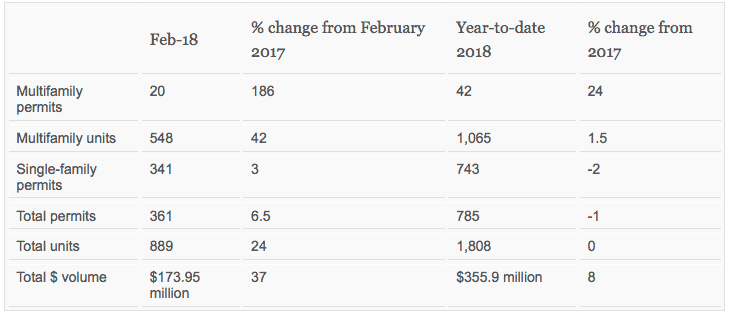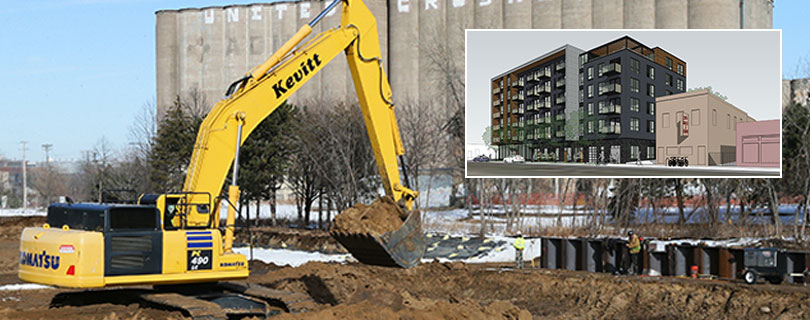A new homebuilding report offers more evidence that the Twin Cities is in for a big year of apartment construction.
On the heels of a Marquette Advisors study that predicts 6,000 new apartment units will enter the market this year, the new Keystone Report shows planned multifamily housing units permitted in February were up more than 40 percent from the previous February.
For the overall housing market, cities in the metro area issued 361 permits for 889 new units in February, according to the Keystone Report. Permits were up 6.5 percent and planned units were up 24 percent. That includes permits for 341 new single-family homes, a 3 percent increase, and 548 new multifamily units, up 42 percent.
Permit activity heated up in February after a tepid start to the year. So far in 2018, the metro area has seen permits for 743 new single-family houses, down 2 percent, and 1,065 new multifamily units, up 1.5 percent. Minneapolis led all cities with permits for 477 new units. That includes the 243-unit Green on Fourth apartments at 2901 Fourth St. SE in the Prospect Park neighborhood, and the 110-unit Marshall Flats project in northeast Minneapolis.
Finance & Commerce reported in September that Minneapolis-based CPM Cos. paid $2.2 million for three parcels at 1319, 1321 and 1327 Marshall St. NE and two parcels at 108 and 114 14th Ave. for the Marshall Flats project. Also reflected in the report is Minneapolis-based Yellow Tree Construction’s 74-unit, five-story apartment complex at 2201 Blaisdell Ave. in Minneapolis.
Outside the metro area, Rochester issued 17 permits for 154 new housing units. During the month, Rochester-based Schoeppner Inc. pulled a permit for the 135-unit Eastgate Apartment complex at 1217 SE Eastgate Drive in the city, according to the Keystone Report. Herb Tousley, director of real estate programs at the University of St. Thomas, said he doesn’t know if the market will see another 6,000 new apartments delivered in 2018. But he expects another solid year for multifamily construction. “The financing is there for good projects. We may see the rate of permits slow down a little, but I don’t think it will slow down a lot,” said Tousley, who predicts 2019 will also be a good year for apartment deliveries.
On the single-family side, the slight uptick in February came after a 6 percent decline in January. Permits are essentially flat for the year so far, and “flat is fine,” said David Siegel, executive director of the Builders Association of the Twin Cities and Housing First Minnesota. Permits for smaller multifamily projects soared in February. Among projects with 16 or fewer units, cities issued 14 permits for 55 new housing units. The sample size is small, but permits were up 250 percent and units up 323 percent year-over-year in that category.
Townhomes and twinhomes represent much of that activity — a sign that builders are trying to meet the demand for more lower-cost housing, Siegel said.“I have been hearing from builders that they are really starting to focus on that twinhome and townhome market, in part because of the affordability challenge,” he said, adding that those products tend to be “a little more affordable.” Besides Minneapolis and Rochester, the top cities for residential permits in February were Hudson, Wisconsin (nine permits, 46 units), Lakeville (30 permits, 31 units), Plymouth (26 permits, 26 units) and Woodbury (21 permits, 25 units). The total value of all permits was $173.95 million, up 37 percent from February 2017.
On the rise: February housing report
Big month for multifamily, modest gains for single-family

